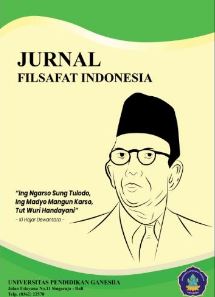Al-Ghazali's (1058-1111 AD) Thoughts About Ethics in Ihya Ulumuddin and Implications for Modern Society
DOI:
https://doi.org/10.23887/jfi.v6i3.62532Keywords:
ethics, Ihya Ulumuddin, Al-GhazaliAbstract
The current social conditions are presented with various kinds of human behavior, good and bad, moral and immoral. This behavior is related to ethics, how humans live life with ethical norms that apply in society or with written norms contained in religious scriptures, both of which aim at the common good. This article aims to explain the behavior of modern society, which has begun to forget the values of goodness even though a Muslim's behavior has been regulated in carrying out social life as it should be included in the current social order. The topic of study in this paper is how the Sufistic ethics of Imam Al-Ghazali in Ihya Ulumuddin and the implications for modern society. The method used in this paper is the analysis of Aristotle's ethical philosophy, by taking an approach to the phenomenon of the social order that is currently developing, and the primary data is the book of Ulumuddin's ihya. The results of this study are that the ethics intended by Imam Al-Ghazali are moral goodness that can nourish individuals in various fields such as politics and socio-economics, welfare, bringing happiness to others and this is in line with the goals of the state, upholding justice, wisdom, and peace and comfort, social services for citizens
References
Abidin, Zainal, and Fiddian Khairudin. 2017. “PENAFSIRAN AYAT-AYAT AMANAH DALAM AL-QUR’AN.” Jurnal Syahadah V, no. 2. http://ejournal.fiaiunisi.ac.id/index.php/syahadah/article/view/188/157
A Gani, 2019. “Urgency Education Morals of Sufism in Millennial Era,” Journal for the Education of Gifted Young Scientists 7, no. 3 (September 16): 547–61, https://doi.org/10.17478/jegys.603574.
Ali, Ausaf. 1996. “ISLAM, SCIENCE, AND ISLAMIC SOCIAL ETHICS.” Islamic Studies 35, no. 4. https://www.jstor.org/stable/20836963
Ali Altaf Mian, 2022. “Agents of Grace: Ethical Agency between Ghazālī and the Anthropology of Islam,” American Journal of Islam and Society 39, no. 1–2 (August 8): 6–40, https://doi.org/10.35632/ajis.v39i1-2.2951
Bahtiar, Amsal. 2005. “Filsafat Ilmu.” Jakarta: Raja Grafindo Persada.
Blackburn, Simon. 2013. Kamus Filsafat. Ll. Yogyakarta: Pustaka Pelajar.
Bradley J. Cook, 2017. “Pre-Mortality in Mystical Islam and the Cosmic Journey of the Soul,” Dialogue: A Journal of Mormon Thought 50, no. 1 (April 1): 31–56, https://doi.org/10.5406/dialjmormthou.50.1.0031.
Dimmock, Mark, and Andrew Fisher. 2017. Ethics for A-Level. Open Book Publishers. https://doi.org/10.11647/OBP.0125.
Ekrem Demirli, 2021. “Tasavvuf Ahlak İlmi Olarak Kabul Edilebilir mi?: Determinist Ahlaka Endeterminist Yaklaşımlar,” İslam Tetkikleri Dergisi 11, no. 2 (October 4): 419–37, https://doi.org/10.26650/iuitd.2021.989772.
Ferr, Frederick. 1970. “The Definition of Religion.” Journal of the American Academy of Religion 38, no. 1 (March). https://www.jstor.org/stable/1461697
Hariantati, Runi. 2003. “Etika Politik Dalam Negara Demokrasi.” Jurnal Demokrasi 2, no. 1 (April 1). http://ejournal.unp.ac.id/index.php/jd/article/view/2544.
Harahap, Burhanudin, Tastaftiyan Risfandy, and Inas Nurfadia Futri. 2023. “Islamic Law, Islamic
Finance, and Sustainable Development Goals: A Systematic Literature Review.”
Sustainability 15, no. 8 (April 13): 6626. https://doi.org/10.3390/su15086626
Heck, Paul L. 2006. “Mysticism as Morality: The Case of Sufism.” The Journal of Religious
Ethics 34, no. 2: 253–86. https://www.jstor.org/stable/40022682
Hermawan, Iwan, Nurwadjah Ahmad, and Andewi Suhartini. 2020. “Konsep Amanah Dalam Perspektif Pendidikan Islam.” QALAMUNA: Jurnal Pendidikan, Sosial, Dan Agama 12, no. 2 (September 8, 2020): 141–52. https://doi.org/10.37680/qalamuna.v12i2.389.
Imam Al-Ghazali, 1100. “Ihya Ulumuddin”.
Islam, Sultan Nazmi Chairul, and Jaaka Yarfa Alhaqqa. 2021. “Pandangan Pemuda terhadap Pentingnya Tata Krama dan Budaya Pendidikan Anak Usia Dini.” Dinamika Sosial Budaya 23. https://journals.usm.ac.id/index.php/jdsb/article/view/3411
Israel Efros, 1967. “Saadia’s General Ethical Theory and Its Relation to Sufism,” The Jewish Quarterly Review 57: 166–77, https://doi.org/10.2307/1453491.
John Kelsay, 1994. “Islamic Law and Ethics: Introduction,” The Journal of Religious Ethics 22, no. 1: 93–99. https://www.jstor.org/stable/40017842
Kosmas Sobon and Timoteus Ata Leu Ehaq, 2021. “KRITIK POSTMODERNISME TERHADAP ETIKA MODERN,” Jurnal Filsafat Indonesia 4, no. 2 (September 1): 132–41, https://doi.org/10.23887/jfi.v4i2.34226
Nanji, Azim. 1991. “Islamic Ethics.” In A Companion to Ethics, Peter Singer. Oxford: Blackwells.
Nizar, Nizar. 2018. “HUBUNGAN ETIKA DAN AGAMA DALAM KEHIDUPAN SOSIAL.” Jurnal Arajang 1, no. 1 (April 9): 27–35. https://doi.org/10.31605/arajang.v1i1.44
Nugraha, Afsya Septa. 2019. “PRINSIP KEPEMIMPINAN DALAM PERSPEKTIF QS. AN-NISA:
-59” 9. https://journal.stitpemalang.ac.id/index.php/madaniyah/article/view/79
Reinhart, A Kevin. 2023. “Islamic Law as Islamic Ethics”. https://philpapers.org/rec/REIILA
Russell, Bertrand. 2020. Sejarah Filsafat Barat. Yogyakarta: Pustaka Pelajar.
Sophia Vasalou, 2022. “Ethics as Medicine: Moral Therapy, Expertise, and Practical Reasoning in al-Ghazālī’s Ethics,” Archiv Für Geschichte Der Philosophie 104, no. 3 (September 7): 468–508, https://doi.org/10.1515/agph-2020-5006
“Surat Al-Mu’minun Ayat 52 - Qur’an Tafsir Perkata.” Accessed February 25, 2023. https://quranhadits.com/quran/23-al-mu-minun/al-muminun-ayat-52/#tafsir-ibnu-katsir.
Taufik, Muhammad. 2018. “ETIKA DALAM PERSPEKTIF FILSAFAT ISLAM,” n.d.
———. 2018. “ETIKA PLATO DAN ARISTOTELES:” Refleksi 18, no. 1. https://ejournal.uin-suka.ac.id/ushuluddin/ref/article/view/1855/1414
Ulfi Faizah, 2020. “ETIKA LINGKUNGAN DAN APLIKASINYA DALAM PENDIDIKAN MENURUT PERSPEKTIF AKSIOLOGI,” Jurnal Filsafat Indonesia 3, no. 1 (April 30): 14–22, https://doi.org/10.23887/jfi.v3i1.22446.
Valerie J. Hoffman, 1999. “Annihilation in the Messenger of God: The Development of a Sufi Practice,” International Journal of Middle East Studies 31, no. 3: 351–69. https://doi.org/10.1017/S0020743800055471
Wael B. Hallaq, 2009. “Groundwork of the Moral Law: A New Look at the Qurʾān and the
Genesis of Sharīʿa,” Islamic Law and Society 16, no. 3/4: 239–79. https://www.jstor.org/stable/40377998
Downloads
Published
Issue
Section
License
Copyright (c) 2023 Jurnal Filsafat Indonesia

This work is licensed under a Creative Commons Attribution-ShareAlike 4.0 International License.

Jurnal Filsafat Indonesia Undiksha is licensed under a Creative Commons Attribution-ShareAlike 4.0 International License.




